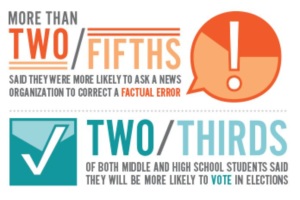NLP model can be successfully sustained and replicated, data show
Newly compiled data from the 2014-15 school year indicate that the News Literacy Project’s model is successful, sustainable and replicable.
 and classroom units.
and classroom units.The data also suggest that NLP’s method of teaching news literacy can be widely replicated in schools across the country.
The findings mark significant milestones in NLP’s seven-year history as it prepares to launch a redesign of its digital program to schools nationwide early next year. They are based on pre- and post-unit surveys of students’ attitudes, knowledge and behavior and were collected and analyzed by Anita M. Baker, NLP’s independent evaluation consultant.
“I am impressed with the high caliber of results across the board,” Baker said. “That’s no small accomplishment. They reflect an undeniable level of skill-building.”
Results from the 2014-15 school year showed that 80 percent of the students who were enrolled in NLP’s digital programs and completed the surveys said that they were better able to evaluate news and information as a result of the unit and that what they learned from NLP was valuable.
The findings also showed that a substantial proportion of students reported noteworthy increases in:
- Their frequency reading a newspaper online or in print.
- Their knowledge and appreciation of the First Amendment.
- Their belief that a free press is important.
NLP’s classroom program produced similar results during the past school year. More than 80 percent of participants in the assessment surveys said they learned:
- How to gather, produce and use credible information.
- How to seek out news that makes them knowledgeable about their communities, the nation and the world.
- To approach information found on the Internet with skepticism.
This year, two new factors were included in the evaluation reporting. The results include Houston, NLP’s first pilot program outside its initial major markets since 2009. Baker also compiled the results nationally over a three-year period (the 2012-13 school year through the 2014-15 school year).
The Houston program produced strikingly similar results to those in the more established regions.
“NLP is able to take a fairly complex strategy, implement it into a public school where no relationships have been established before, and the results look similar to locations that have been using the program for five or six years,” Baker said. “It’s impressive that the project can do this.”
The over-years data show both consistency over time and gains from one school year to the next.
Baker’s message to NLP? “Don’t change what you’re doing,” she said, “because it certainly seems to work.”
Learn more about the results of NLP’s 2014-15 evaluation and the three-year assessments.
